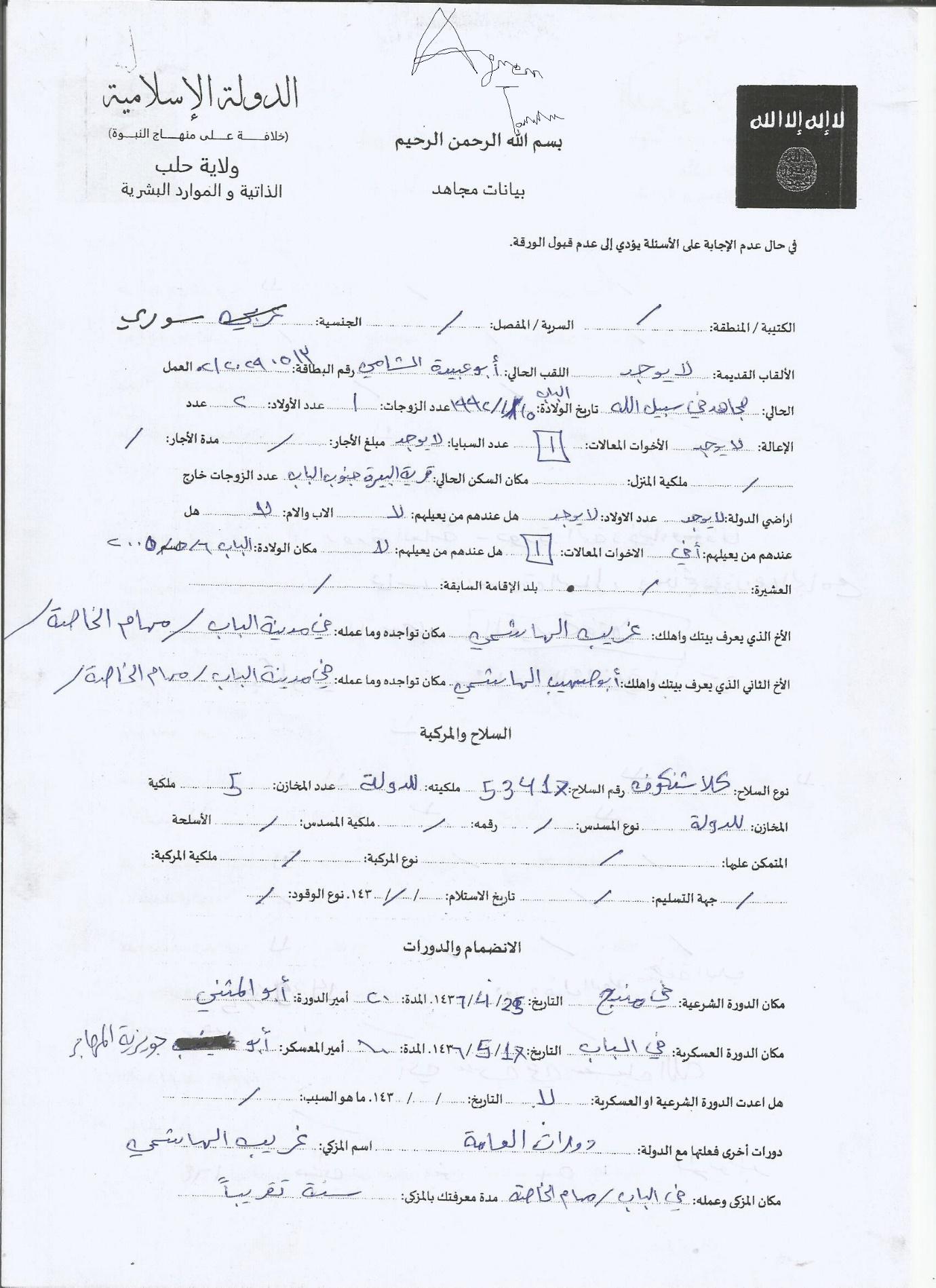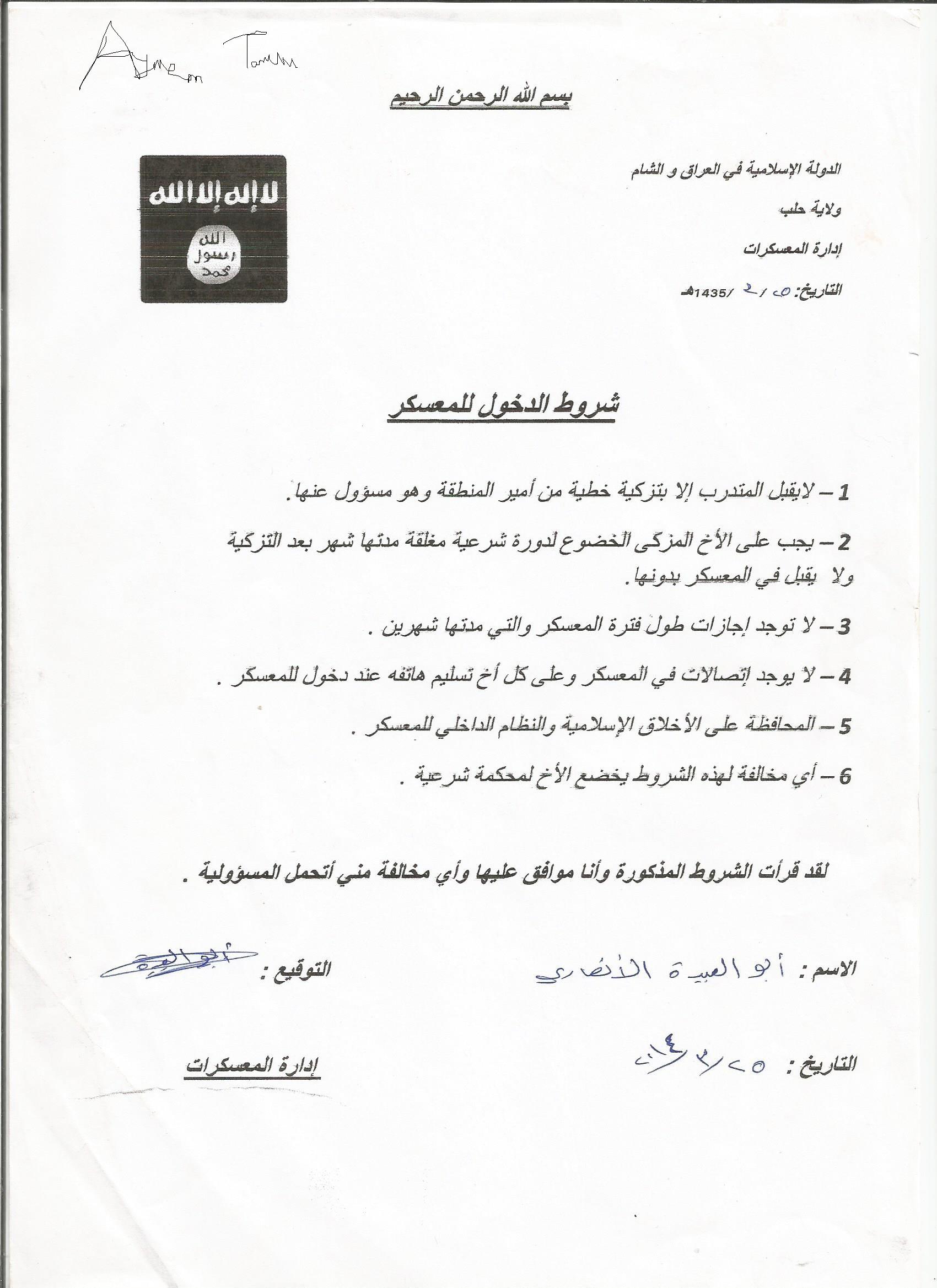NOTE: For prior parts in The Archivist series you can view an archive of it all here. And for his older series see: Musings of an Iraqi Brasenostril on Jihad.
—
Unseen Islamic State Training Camp Contract
By Aymenn al-Tamimi
The management of training camps for the Islamic State (IS) falls under an administrative body called Idarat al-Mu’askarat (“Camps Administration”). This body will naturally be linked to the Diwan al-Jund (“Department of Soldiers”), one of a series of diwans drawn up and established for the declaration of the Caliphate.
Some details of the functioning of the training camps exist in testimony outside of internal documentary evidence. For example, Omar Fawaz, a pro-IS activist based in Mosul who abandoned media work, distinguished in postings he put in 2015 between training camp courses for the muhajireen (i.e. foreign fighters), which according to him can last 90 days or more, and training camp courses for the ansar (ï.e. local Syrians and Iraqis) that last 30-50 days. He also noted distinctions as regards the ages of recruits: those between the ages of 5 and 15 are classed as ashbal (“cubs”) while those aged 15 and above are classed as adults.
Training camp routines in their current form appear to consist of combinations of sessions of physical training, combat training and Shari’i study. Some of the internal textbooks used to teach training camp recruits about Islam have come to public light, most notably the Muqarrar fi al-Tawheed (“Course in Tawheed”), which I have translated in full here. These books are issued by the Diwan al-‘Iftaa wa al-Buhuth (a diwan that issues fatwas and investigates religious matters, publishing studies and pamphlets).
The document that is the focus of this piece and was obtained amid the current Turkish-backed Euphrates Shield rebel push on the IS stronghold of al-Bab in north Aleppo countryside helps shed some further light on the functioning of the training camps. Note that the document- a contract for agreement to enter a training camp- dates from the time before the declaration of the Caliphate, and thus has the label of the Islamic State in Iraq and al-Sham. The document is also useful in this context in illustrating the existence of the Idarat al-Mu’askarat prior to the establishment of the Caliphate, illustrating that the foundations of present IS administration as we know it did not spring out of nowhere, but rather the groundwork was laid in significant part by real control of territory in Syria over the course of 2013 and the first half of 2014.
Of more specific note are some of the terms of the contract. For example, a recruit must have a written tazkiya (vouching for someone) from the amir of the area in order to enter the training camp. It is important to point out here that tazkiya exists on multiple levels within IS. The concept is foremost associated with the initial recruitment of someone into the ranks of IS. In the fighter files that were leaked last year to multiple media outlets, the files notably take the form of questionnaires under the title of Bayanat Mujahid (“Statements [/Data] of a Mujahid”). These files- which date in considerable part from the pre-Caliphate era and came under a bureaucratic department known as the “General Administration for the Borders” (the predecessor body to the Hijra Committee that partly deals with new arrivals to IS territory)-include the question of whether someone has tazkiya. In contrast, the tazkiya that we see in this training camp contract can be thought of as an example of what we might call internal tazkiya. On the basis of other internal documents (namely, Abu al-Faruq al-Masri’s dissenting work al-Manhaj al-Sayasi wa al-Tandhimi lil-Dawlat al-Islamiya), this concept also exists in other areas of IS administration such as the Hisba and Zakat departments, where recruiting new personnel should involve tazkiya from persons who have competencies in the same fields of expertise/vocation as these recruits.
Another term of interest is the requirement for the recruit after tazkiya to undergo a Shari’i course for a month before being accepted into the camp. This does not necessarily mean that there is no Shari’i study in the camp itself. However, it is notable from later specimens I have of Bayanat Mujahid forms that a distinction is made between a Dawra Shari’ia (“Shari’i course”) and a Dawra ‘Askariya (“military course”). These documents clearly follow the Caliphate declaration and come under the label of personnel data and human resources. Observe a sample document below (Figure 1)- also obtained amid the offensive on al-Bab- featuring part of a Bayanat Mujahid form from Aleppo province (Wilayat Halab) for one Abu Obeida al-Shami. In the section entitled “joining and courses,” we see he had a Shari’i course in Manbij lasting 20 days, and a military course in al-Bab for 10 days. The former has an entry for the amir of the Shari’i course, while the latter has an entry for the amir of the camp.

Figure 1: Part of the Bayanat Mujahid form for Abu Obeida al-Shami
In total, the Dawra Shari’ia and Dawra ‘Askariya entries in these forms I have from the al-Bab area mostly seem to add up to around 30 days or slightly more. Perhaps when Omar Fawaz wrote of the training camp course times for local fighters, he was adding these entries together. From the contract, the total time of the Shari’i course and time in the camp add up to 3 months (a month of the Shari’i course and 2 months in the camp), which equates to training camp times for the muhajireen as per Omar Fawaz’s testimony. In this case though the signatory is a local fighter, as borne out in his Ansari kunya. Could it be that the contract reflects an earlier set of circumstances in which there was a greater influx of muhajireen? Are the contract conditions localized for Aleppo province? A degree of speculation comes in here on account of insufficient quantities of documentary evidence.
Finally, note the reference to ijazat in the contract, with the stipulation that ijazat are not to be granted during the time one is in the camp. Ijazat are leave permits granted to personnel for a variety of reasons (e.g. to see one’s family) and they are among the most common IS documents that turn up when left behind by retreating IS forces. For samples of these leave permits, see my raw archives of IS documents.
Below is the training camp contract, with full translation and explanatory notes in square brackets.

Figure 2: Training camp contract
In the name of God, the Compassionate, the Merciful
Islamic State in Iraq and al-Sham
Wilayat Halab [Aleppo province]
Idarat al-Mu’askarat
Date: 25 Rabi’ al-Awal 1435 AH [appears to be an error: confusion with handwritten CE date at end of contract]
Conditions to enter the camp
1. The trainee is only to be accepted with written tazkiya from the amir of the area and he is responsible for it.
2. The brother given tazkiya must be subjected to an indoor Shari’i course for a month after tazkiya. He cannot be accepted in the camp without it.
3. There are no ijazat during the time one is in the camp, whose period is 2 months.
4. There are no connections in the camp and every brother must hand over his phone on entering the camp.
5. Observe Islamic ethics and the internal system for the camp.
6. Any violation of these conditions will mean the brother is subjected to a Shari’i court.
I have read the above conditions and agree to them. I bear responsibility for any violation on my part.
Name: Abu al-Obeida al-Ansari
Signature: Abu al-Obeida
Date: 25 March 2014 CE
Idarat al-Mu’askarat
The Archivist: Unseen Islamic State Training Camp Contract
Posted on
